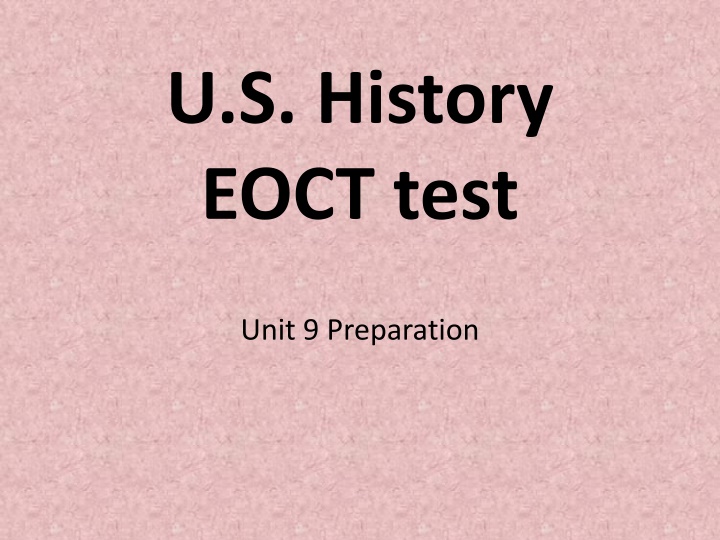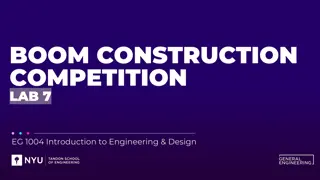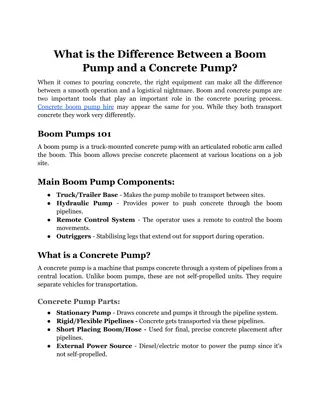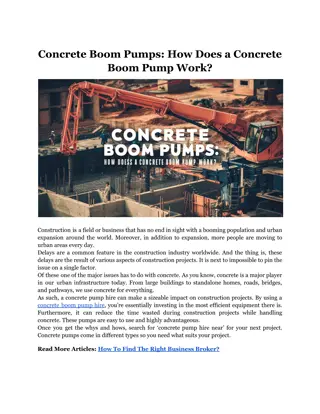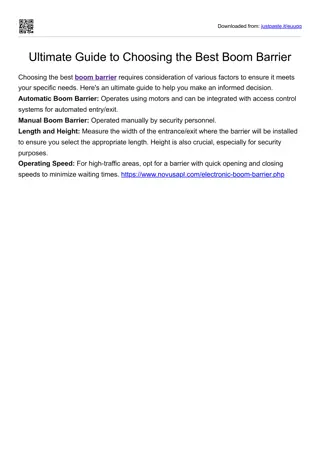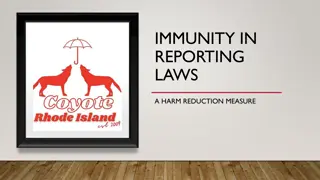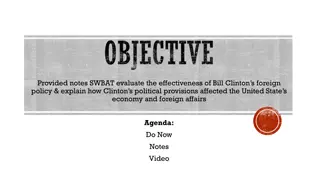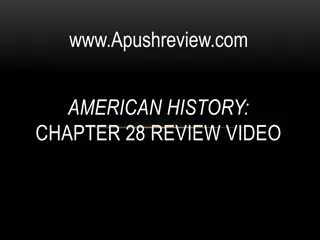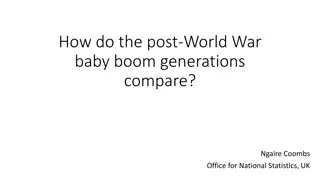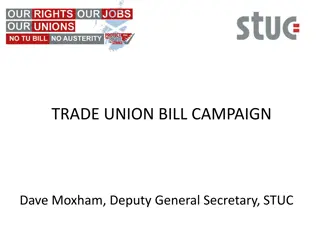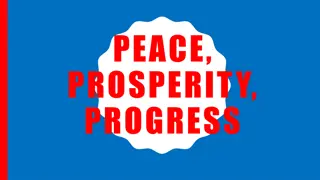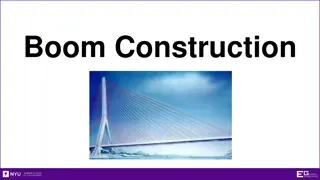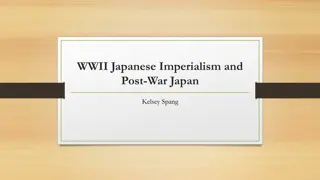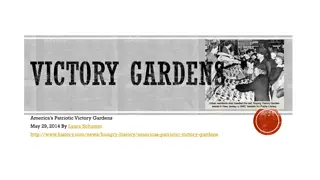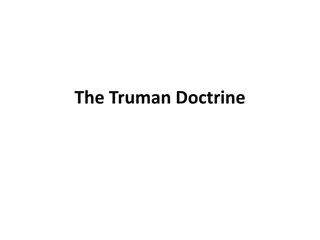Impact of GI Bill and Baby Boom on Post-WWII America
Following World War II, the GI Bill and Baby Boom reshaped American society. The GI Bill provided returning veterans with access to education, training, home loans, and other benefits, leading to a social revolution marked by increased home ownership. The subsequent Baby Boom resulted in a significant population surge, with a generation of baby boomers born in the aftermath of the war. Additionally, initiatives like Levittown and the Interstate Highway Act played key roles in changing the landscape of suburban development and transportation infrastructure, further impacting the nation's growth and culture. Television also emerged as a powerful medium influencing American culture, notably through presidential debates and coverage of the Civil Rights Movement.
Download Presentation

Please find below an Image/Link to download the presentation.
The content on the website is provided AS IS for your information and personal use only. It may not be sold, licensed, or shared on other websites without obtaining consent from the author.If you encounter any issues during the download, it is possible that the publisher has removed the file from their server.
You are allowed to download the files provided on this website for personal or commercial use, subject to the condition that they are used lawfully. All files are the property of their respective owners.
The content on the website is provided AS IS for your information and personal use only. It may not be sold, licensed, or shared on other websites without obtaining consent from the author.
E N D
Presentation Transcript
U.S. History EOCT test Unit 9 Preparation
SSUSH 21a Describe the baby boom and the impact as shown by Levittown and the Interstate Highway Act.
GI Bill changes society Serviceman s readjustment Act GI stands for Government Issue Gave returning veterans money to further their education, training, home loans and property and other benefits. This money resulted in a social revolution because common people could afford homes.
Baby Boom Because of the GI bill the nation experienced an increase in births which caused a population explosion. Baby boomers are members of the generation born within the first few years after World War II. The numbers of babies born in 40s and early 50s.
Levittown A developer like William Levitt became rich by building entire communities of homes. Levitt sold home quickly and cheaply because of the close proximity of the homes. Suburbs expanded because of the GI Bill and Levitt s building strategy
Interstate Highway Act Dwight Eisenhower supported the National Highway Act 1956 Concern about a possible nuclear strike against the U.S. Highway system provided improved mobility for motorists and also caused expansion of the Suburbs. Improved military and troops to move quickly and meant people could evacuate much faster in the event of war.
National Defense U.S. Military could mobilize faster in case of Invasion of U.S. People could evacuate areas under threat faster.
Transportation Helped those living in Suburbs travel to find work in the cities.
SSUSH 21b Describe the impact television had on American Culture; including the presidential debates (Kennedy/Nixon, 1960) and news coverage of the Civil Rights Movement.
Impact of Television on Civil Rights Movement Revolutionized media coverage. Televised coverage of the violence against African Americans won sympathizers to their cause.
Impact of Television on American Culture People could watch entertaining shows, news reports, advertisements, etc. from the comfort of their own homes. Television stars became nationally admired. Lucille Ball on the I Love Lucy show.
Impact of Television on American Politics Presidential Debates (Kennedy/Nixon, 1960) Kennedy looked younger, confident, good-looking and won the election Politicians had to worry about how they looked on screen
SSUSH 21c Analyze the impact of technology on American life, include the development of the personal computer and the cellular telephone and the expanded use of air conditioning.
Impact on American Life made by Personal Computer & Cell Phone Computers made US business, making calculations, and transactions faster and business more efficient. Used to tally census in 1950 Today found in many homes. Emails, websites, transfer data, receive information quickly. Cell phones also improved communication in the U.S. Revolutionary technology that affected communication in the U.S.
Eisenhowers response to Sputnik I October 4, 1957 the Soviets launched Sputnik 1 during the Cold War. Signaled a technology gap between the U.S. and the Soviet Union On July 29, 1958 the National Aeronautics Space Act created the Government Agency NASA Its goal was to Pioneer the future of space exploration, scientific discovery, and aeronautics research. National Aeronautics and Space Administration (NASA)
SSUSH 22a Explain the importance of President Truman s order to integrate the U.S. military and the federal government.
Harry Truman & Integration of U.S. Military and Federal Government Truman was disturbed by the violence against southern blacks and became a supporter of Civil Rights. Wanted to ensure voting rights and fair employment to African Americans. July 26, 1948 Signed Executive Order 9981 integrating the United States Military
Executive Order 9980 & 9981 EO 9980 Created the Fair Employment Board to eliminate racial discrimination in federal employment. EO 9981-established the President s Committee on Equality of Treatment and Opportunity in the Armed Services.
SSUSH 22b Identify Jackie Robinson and the integration of baseball.
Jackie Robinson Born Cairo, GA First African American during the Modern Era to play Baseball in the Major League.
SSUSH 22c Explain Brown v. Board of Education and efforts to resist the decision.
Major Court cases Plessy v. Ferguson Established the doctrine of Separate but Equal that allowed segregation.
Major Court Cases Brown v. Board of Education Established that the policy of Separate but equal was unconstitutional. Overturned Plessy decision!
Little Rock, Arkansas - 1957 Governor Orval Faubus Central High School Refused to allow African American students in.
Eisenhower & Little Rock, Arkansas President Eisenhower sent U.S. troops to Little Rock (Central High School) to enforce the law.
Alabama Governor George Wallace In the name of the greatest people that have ever trod this earth, I draw the line in the dust and toss the gauntlet before the feet of tyranny, and I say segregation now, segregation tomorrow, segregation forever.
SSUSH 22d Describe the significance of Martin Luther King, Jr. s Letter from Birmingham Jail and his I Have a Dream speech.
Letter from Birmingham Jail Famous civil rights writing in which he addressed white preachers statements that mass protest and civil disobedience were not necessary and the courts should handle complaints.
Martin Luther King, Jr. I have a dream speech Delivered before the Lincoln Monument during 1963 March on Washington. 200,000 civil rights activists were in attendance. Demanding equality for all Citizens.
African-American Civil Rights Movement Overturned the Plessy case by declaring that segregated facilities were inherently unequal, and ordered the integration of the nation's public schools. Brown v. Board (1954) Rosa Parks refused to give up her seat in the front of a Montgomery, Alabama, public bus for a white rider, leading African-Americans to boycott public bussing. Montgomery Bus Boycott (1955) After schools in Little Rock, Arkansas, refused to admit African- Americans to all-white schools, President Eisenhower authorized the U.S. Army to escort and protect African- American students. Little Rock Crisis (1957) Governor George C. Wallace refused to allow African-American students to register for classes at the all-white University of Alabama. President Kennedy authorized the use of the National Guard to enforce educational integration. University of Alabama (1963) Martin Luther King and his SCLC organized a massive demonstration in Washington, D.C., where he delivered his famous "I Have a Dream" speech. March on Washington (1963)
SSUSH 22e Describe the causes and consequences of the Civil Rights Act of 1964 and the Voting Rights Act of 1965.
African-American Civil Rights Law Provides criminal penalties for discrimination in employment or voting and integrates most public facilities. Civil Rights Act of 1964 24th Banned the poll tax. Amendment (1964) Banned literacy tests in counties where over half of eligible voters have been disenfranchised. Voting Rights Act of 1965
Civil Rights Act of 1964 Prohibited Segregation in Public Accommodations Hotels Restaurants Prohibited discrimination in Employment and Education Jobs Schools Gave President the Power to Enforce the Law Military National Guard
Voting Rights Act of 1965 Suspend Literacy Test for voter registration Send federal officials to register voters Results in huge increased in African American voter registration Results in increased number of African American Candidates
SSUSH 23a Describe the Warren Court and the expansion of individual rights as seen in the Miranda decision.
Miranda v. Arizona Earl Warren Chief Justice 1966 Ernesto Miranda arrested and interrogated w/o lawyer present. Confessed to Kidnapping and Rape The Court held that Miranda s 5th amendment protection against self incrimination and his 6th amendment right to counsel had been violated. Police officers must read to people arrested prior to questioning. You have the right to remain silent
Miranda v. Arizona Expanded the Rights of Individuals
SSUSH 23b Describe the political impact of the assassination of President John F. Kennedy; include the impact on civil rights legislation.
JFK Assassination - Impact Helped President Lyndon Johnson push through civil rights legislation Economic Opportunity Act of 1964 Civil Rights Act of 1964.
SSUSH 23c Explain Lyndon Johnson s Great Society; include the establishment of Medicare.
Lyndon Baines Johnson Great Society Program
LBJ's Great Society Provided poor, disabled, and minority kids with extra academic assistance through pre-school in order to ensure educational success. Head Start (1965) Provided training for poor, minority inner-city youth in order to cultivate job skills. Job Corps (1966) Extended Social Security benefits by providing health insurance for the elderly. Medicare (1965) Medicaid (1966) Provides health insurance for the poor and disabled. Volunteers In Service To America; Organized youth volunteers to work in economically depressed areas. VISTA (1966)
SSUSH 23d Describe the social and political turmoil of 1968, include the assassinations of Martin Luther King, Jr. and Robert F. Kennedy, and the events surrounding the Democratic National Convention.
1968 Social and Political Turmoil. Defining Moment in the Modern Era of U.S. History. Tet Offensive Assassination of Martin Luther King, Jr. Assassination of Robert F. Kennedy Riots at the Democratic National Convention
